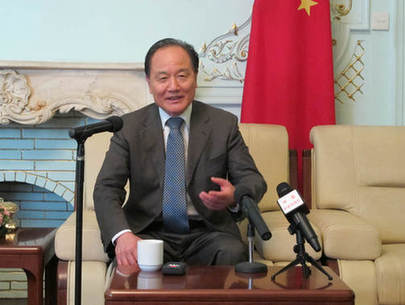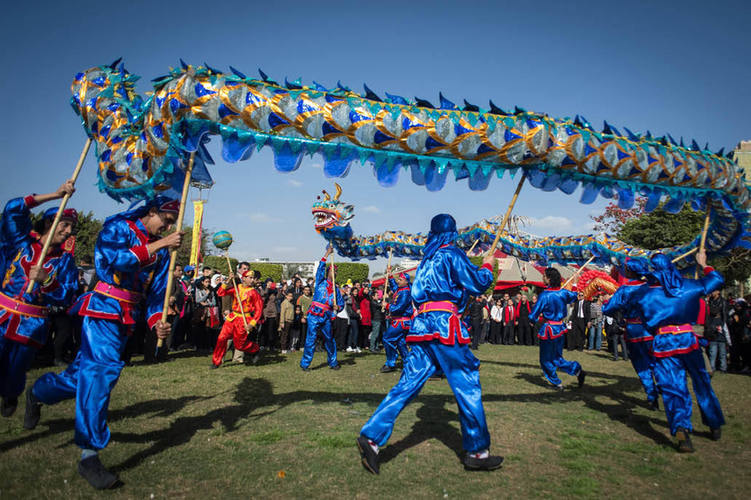A New Milestone in Sino-Egyptian Relations
By WU SIKE

AT the start of the New Year, Chinese President Xi Jinping paid state visits to Egypt and Saudi Arabia, among other West Asian and North African countries. As former envoy to these two countries, I found this most gratifying.
The year 2016 marks the 60th anniversary of the establishment of diplomatic relations between China and Egypt. This year is hence of great significance in the development of Sino-Egyptian -- even Sino-Arab relations. The Belt and Road Initiative proposed by Xi Jinping two years ago has received wide recognition in Egypt and the Arab world, and is now in the implementation phase. The Asian Infrastructure Investment Bank (AIIB), an accompanying initiative also up and running, is a new and important platform for Sino-Arab cooperation. Among its founding members are seven Arab states, including Egypt and Saudi Arabia.
Meanwhile, Egypt’s political transformation has entered a new stage, its main task to seek stability and promote development. This shared historical mission brings China, Egypt and other Arab countries closer together. Xi’s visit in January further promoted mutual understanding and bilateral cooperation, and comprehensively upgraded bilateral strategic cooperation. It was thus a milestone in Sino-Egyptian and Sino-Arab relations.
Longstanding Relations Augur Broad Cooperation Prospects
An Arab nation in North Africa, Egypt is a large developing country whose dominant religion is Islam. Deepened Sino-Egyptian cooperation has a solid foundation and denotes broad prospects. China has always perceived and developed Sino-Egyptian relations from a strategic level and long-term point of view, having supported Egypt’s quest for stability and development through practical actions. Over the past half century, China and Egypt have shown understanding, respect, trust and support for one another. Egypt was the first Arab country with whom the PRC established diplomatic relations. It was also the first developing country with whom China set up a 21st century-oriented strategic cooperative relationship.
The new historical period signals a brand new chapter in Sino-Egyptian relations, as Egypt undergoes a great social transformation. China firmly supports the Egyptian people’s right to make their own choices, oppose external interference, and persevere in consolidating and developing bilateral cooperation and people-to-people exchanges.
Cooperation between the two sides in various fields, therefore, has steadily progressed. At the end of 2014, China and Egypt elevated their bilateral ties to a comprehensive strategic partnership. Sino-Egyptian relations thus serve as a model for Sino-African, Sino-Arab and South-South cooperation.
Egyptian President Abdel Fattah al-Sisi has visited China twice since taking office. He also participated in activities held in Beijing in September 2015 to commemorate the 70th anniversary of the victory of the Chinese People’s War of Resistance Against Japanese Aggression and the World Anti-Fascist War. The Egyptian guard of honor was the sole African and Arab patrol to participate in the military parade starting at Tian’anmen Square, so signifying the close relations and deep friendship between China and Egypt.
The two nations also signed an agreement on boosting cooperation in production capacity, so setting the direction of bilateral pragmatic cooperation in the new historical period, and enriching the connotations of China-Egyptian comprehensive strategic partnership. Alongside implementation of the Belt and Road Initiative and accelerated development of the Suez Canal Corridor, China and Egypt share much in common as regards strategic goals and development ideas. This provides a new growth point and driving force for the development of Sino-Egyptian relations in the new era.
To achieve common dreams such as building a strong and prosperous country, achieving the great rejuvenation of the nation, and providing people with a happy life, both sides place high hopes on bilateral cooperation. It is with these aims in mind that they proactively promote pragmatic cooperation. China and Egypt have seen emerging cooperation potential in such fields as trade, investment, infrastructure, energy, transport, culture, and education. In 2014, the trade volume between Egypt and China reached a historical high of US $11.6 billion. From January to September 2015, the figure hit US $9.67 billion – a 13 percent year-on-year increase. Sino-Egyptian relations will embrace even brighter development prospects.
New Historical Opportunities for Sino-Arab Cooperation
China and Arab countries always show mutual respect and trust for one another, and persevere in seeking common development through win-win cooperation. The Chinese and Arab/Islamic civilizations first experienced exchanges and mutual learning more than 1,000 years ago, through the ancient Silk Road. Exchanges between the two old civilizations have remained constant.
Since entering the new millennium, the world has become smaller thanks to economic globalization and informatization. Sino-Arab relations established on the foundation of mutual respect and win-win cooperation have seen leapfrog development. Establishment of the China-Arab States Cooperation Forum in 2004 in particular elevated bilateral relations, featuring comprehensive cooperation and common development, to a strategic level.

China has declared its stance in light of the great revolution and social transformation in the Arab world. First, China understands and respects the people in these countries and regions’ aspirations and demands for change, their wishes and choices. China opposes other countries’ intervention in the internal affairs of the nations involved, and firmly believes that disputes should be solved through dialogue and other political approaches. China disapproves of and would never endorse the resolution of disputes through violence.
Second, China hopes that hotspot issues in the Middle East may be solved through political efforts, and is willing to make its contribution to bringing peace to the region.
Third, China supports these countries’ independent choice of their particular development paths, and would gladly exchange experiences in state governance with Middle Eastern countries.
Fourth, China provides, as it always has, economic, technical and humanitarian assistance to these countries.
Fifth, China proactively supports and encourages inter-civilization exchanges with Arab countries, and mutual learning through sharing state governance experience and promoting win-win cooperation. Sino-Arab relations will continue to develop despite various changes.
Meanwhile, the vicissitudes of the international situation, the global financial crisis and the grave regional security situation all pose new challenges to China and Arab nations in their quest for peace and stability, economic development, sustainable use of energy and resources, and environmental protection. Achieving sustainable development has become the common concern and pursuit of both sides. President Xi Jinping proposed in September and October of 2013 the Silk Road Economic Belt and 21st Century Maritime Silk Road. This plan represents a new development strategy featuring cooperation, and expresses the Chinese leader’s strategic thinking and global vision.
When Xi Jinping met with the Gulf Cooperation Council (GCC) delegation in January 2014, he emphasized that Arab countries located in the western intersection of the Belt and Road Initiative are natural and important cooperative partners, and that China sets great store on cooperating with Arab countries in the co-building of the Belt and Road.
At the Sixth Ministerial Conference of China-Arab States Cooperation Forum held in Beijing on June 5 of the same year, Xi Jinping proposed that the two sides adhere to the principle of discussion, co-construction and sharing in jointly building the Belt and Road. He put forward a “1+2+3” cooperation pattern.
One means taking energy cooperation as the core. Xi called for deepened cooperation along the whole oil and natural gas industrial chain to ensure safe energy transport routes and establish a long-term strategic cooperative energy relationship between China and the Arab world that is mutually beneficial, secure, reliable and friendly.
Two means making infrastructure construction and trade & investment facilitation the two wings of the cooperation. Xi urged all parties to strengthen cooperation in major development projects and landmark projects that are relevant to people’s livelihood, and to make relevant institutional arrangements to promote two-way trade and investment.
Three refers to the three high- and new-tech fields of nuclear energy, space satellites, and new energy as breakthroughs through which to upgrade China-Arab pragmatic cooperation. As regards high- and new-technology cooperation, Xi also proposed discussions on the construction of three centers: a China-Arab technology transfer center, an Arab training center for peaceful use of nuclear energy, and a center for application of China’s Beidou Navigation Satellite System (BDS) in Arab nations.
Jointly building the Belt and Road has become a main strand of China-Arab cooperation that will upgrade bilateral cooperation in business and trade, energy, infrastructure, and high-tech to a new level. The three centers Xi proposed will shortly be constructed. This will bring China and Arab nations closer, forging communities of common interests and a shared future. It will also encourage both sides’ innovation of their institutions, their tapping of potential domestic demand, enhancement of inherent dynamism, and creation of new growth points of economic development.
Looking to the future, China and Arab states face historical opportunities amid deepening win-win cooperation and realization of common development. China will make continuous efforts with Arab nations to carry forward the Silk Road spirit of peaceful cooperation, mutual accommodation, learning from each other, and the pursuit of mutual benefit. China will steadily deepen mutual respect and trust, connect development strategies, expand bilateral practical cooperation in various fields, tap cooperation potential, and innovate cooperative modes, so flying the banner of peace and development as it heads towards a brighter future.
People-to-People and Cultural Exchanges a Long Way Ahead
People-to-people and cultural exchanges play a crucial role in supporting the co-construction of the Belt and Road, and pragmatic cooperation is equally important. China and Arab nations are both main cradles of splendid human civilizations, and good friends who learn from one another. Although China and the Arab world have different histories, cultures, social systems, and development models, both sides have conducted longstanding cultural exchanges. Each, moreover, supports diversified cultures, mutual respect, and learning.

Today China and Arab states, including Egypt, carry out proactive reciprocal cultural activities: China has signed agreements with almost every Arab country as regards culture, education, and healthcare, and their corresponding annual implementation plans. Both sides send frequent cultural delegations to one another, and conduct news media cooperation, as well as religious and talent interchanges. They have also established research institutions that organize academic, language, and education exchanges. These enhanced cultural activities have consolidated friendship, and played a positive role in easing international disputes and building a harmonious world.
So far, China has established 19 Confucius Institutes in the Middle East. In 2013 the number of Arab students in China was 14 times that in 2003. China and Middle Eastern countries continue to expand cultural exchanges and dialogues through cultural forums, cultural years and art festivals. These activities serve as a bridge for China and Arab nations – two different civilizations – to hold dialogues on the foundation of mutual respect.
Common interests remain an inexhaustible source of dynamism in Sino-Arab cooperation. However, the complicated and turbulent situation in the Middle East and the collision of different civilizations pose new challenges to China and Arab nations. There is still a long way to go as regards promoting inter-civilization respect and learning. President Xi’s last visit linked China’s efforts to pursue the Chinese Dream with the Arab states’ plan to achieve transformation and development, and promote national rejuvenation.
In future, China and Arab countries, including Egypt, will deepen their cooperation and together upgrade their comprehensive strategic partnership, so jointly building a community of common interests and a shared future.
-----------------------
WU SIKE is China's former special envoy on the Middle East issue and a senior diplomat.
- A New Milestone in Sino-Egyptian Relations
- Lifting China-Saudi ties to comprehensive strategic partnership an irresistible trend: Xi
- China, Saudi Arabia elevate bilateral ties, eye more industrial capacity cooperation
- Interview: Arab-China ties "ideal", Xi's visit to Arab League "very important event": AL chief
- China, Arabs look for enhancing media cooperation
